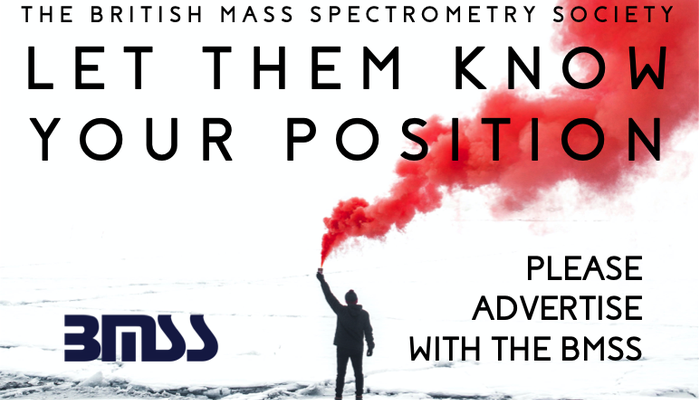Introduction to MS Course
The BMSS Introduction to Mass Spectrometry course covers all fundamental aspects of mass spectrometry, including theory, instrumentation, applications, interpretation and best practice.
The next 2-day BMSS Introduction to Mass Spectrometry Course will be held online in December 2025.
Keep an eye on this page for updates!
Please contact education@bmss.org.uk (Andrea Lopez, BMSS Education Officer) for any course content-related enquiries and admin@bmss.org.uk (Lisa Sage, BMSS Administrator) for registration-related enquiries.
Who should attend?
This introductory course assumes an undergraduate level of basic chemistry but requires no previous knowledge of the technique or practical experience. It is designed for scientists who use mass spectrometry, from archaeology to zoology, including novices and ranging to laboratory managers who will be employing mass spectrometry data in their analytical projects and wish to gain a solid understanding of the technique or who want to gain an awareness of its potential applications. The course will be useful for postgraduate research students embarking on research projects involving mass spectrometry. Current users of mass spectrometry will also find the course an excellent refresher to the theory of the technique and a means to keep abreast of recent developments and advances.
Course Content
This course will introduce the basic concepts and terminology of mass spectrometry. The most important ionisation techniques used in mass spectrometry are explained, including electrospray ionisation, matrix-assisted laser desorption/ionisation and atmospheric pressure ionisation techniques, as well as the most common mass analysers such as quadrupoles, ion traps, time-of-flight (TOF), Orbitrap, and Fourier transform ion cyclotron resonance (FTICR).
The following topics are also covered: exact atomic and molecular masses, isotopes, mass resolution, sample preparation, ionisation methods, mass analysers, ion detection, processing of data, quantitation, elementary data interpretation, and considerations for the troubleshooting. Using relevant, real-world examples such as common drugs and clinically relevant analytes, the course will illustrate both qualitative and quantitative applications of mass spectrometry.
The course is designed to give attendees a solid foundation in mass spectrometry, to appreciate the advantages and limitations of the technique and to assist scientists in choosing the most appropriate instrumentation for a particular analytical challenge.
Course modules
- Basics of Mass Spectrometry, Dr. Mark Barrow (University of Warwick, UK)
- Ionisation Techniques, Dr. Christopher Wootton (Bruker Daltonik GmbH, Germany)
- Mass Analysers I, Dr. Christopher Titman (Shimadzu Corporation, UK)
- Mass Analyses II, Dr. Ashley Sage (Waters Corporation, UK)
- High Resolution & Accurate Mass, Prof. Neil Oldham (Nottingham University, UK)
- MS/MS Experiments and Interpretation, Dr. Stephen Holman (AstraZeneca, UK)
- Sample Preparation, Dr. Mike Morris (Waters Corporation, UK)
- Quantitation of small molecules, Dr. Andrea F. Lopez-Clavijo (Resolian, UK)
- Troubleshooting, MS methods and interpretation tips, Dr. Stephanie Rankin-Turner (University of Pittsburgh, USA)
Course Material
Each delegate will receive a course manual containing complete lecture notes together with other background information such as key references and a guide to mass spectrometry resources. Copies of Best Practice Guides for Generating Mass Spectra and Accurate Mass Measurement of Small Molecules are also provided.
Continuing Personal Development
Professional Bodies, such as the Royal Society of Chemistry, will accept the course as contributing to an individual’s CPD Portfolio if it relevant to their employment.
Certificate of Attendance
On completion of the course delegates may request a certificate of attendance from the BMSS Administrator.
Course Tutors
The course tutors are all members of the BMSS, drawn from industry, instrument manufacturers, public institutions, and academia. The tutors have considerable experience in the theory and application of mass spectrometry. In addition to the lecture material, the course incorporates “meet the expert” sessions which provide attendees with the opportunity to access this expertise for their own projects and for networking within a rapidly growing user base.
This year in addition to the tutors that will deliver the modules we have experts from a diverse range of applications that will attend the "meet the expert" session:
- Victoria Tyrrell (Cardiff University)
- Adam King (Waters Corporation)
Reciprocal Registration Rates for Members of Partner Societies
The BMSS offer reciprocal rates to members of the following societies:
- Royal Society of Chemistry - Separations Science Group (RSC-SSG)
- Chromatography Society (ChromSoc)
- British Society for Proteome Research (BSPR)
Please contact the BMSS Administrator for your discount code: admin@bmss.org.uk


